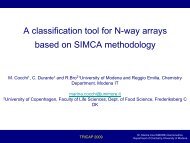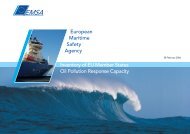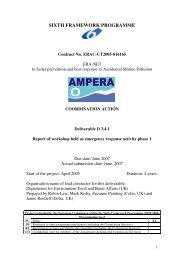Members Handbook 2002 - Centre d'Investigació i ...
Members Handbook 2002 - Centre d'Investigació i ...
Members Handbook 2002 - Centre d'Investigació i ...
You also want an ePaper? Increase the reach of your titles
YUMPU automatically turns print PDFs into web optimized ePapers that Google loves.
natural mortality rates, which in thecase of the eggs and larvae of somemarine species can exceed 99.99%.However, this over-production of youngstages ensures that there is aconsiderable reservoir for thecolonisation of new areas, and for thereplacement of any adults which havebeen killed as a result of an oil spill.Long-lived species, on the other hand,that do not reach sexual maturity formany years and which produce fewoffspring may take longer to recoverfrom the effects of an oil spill.Nevertheless, many of these do havein-built compensatory mechanisms toovercome the large mortalities that canoccur due to natural causes, such assevere storms or events like El Niño.Thus, some species of seabirds havebeen shown to mature earlier and tohave extra broods after a period ofpopulation decline. Migration of adultsand juveniles from neighbouring areaswhich have escaped the unfavourableconditions also frequently enhance therecovery process.22Habitats and Species at RiskIt is rare that the animals and plantsliving in the world’s oceans and seasare seriously affected by an oil spill dueto the high dilution potential that thishabitat provides. Concerns are oftenexpressed about the potential effects ofspills on fish and shellfish eggs andlarvae which are found in the planktonbut there is no evidence that oilinducedlosses have a significant effecton population numbers, especiallywhen compared to the enormousnatural mortalities.Whales, dolphins and seals in the opensea are not particularly at risk from oilspills. Marine mammals that breed onshorelines are, however, more likely toencounter oil. Species which rely on furto regulate their body heat are the mostvulnerable since, if the fur becomesmatted with oil, the animals may diefrom hypothermia or overheating.Seabirds are the most vulnerable usersof open waters since they are easilyharmed or killed by floating oil. Speciesthat dive for their food or which roost onthe sea surface are particularly at risk.Although oil ingested during preeningmay be lethal, the most common causeof death is from drowning, starvationand loss of body heat following damageto plumage by oil. Nevertheless, thenatural recovery mechanisms describedearlier normally ensure that after arelatively few years there is nodiscernible impact on breedingpopulations, even when oil spillmortalities have been high.






